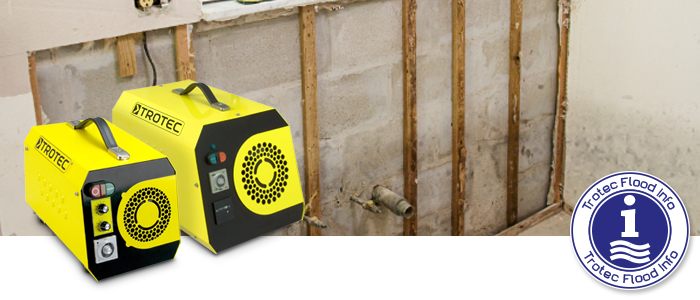
In connection with a water damage an unpleasant smell often appears. It smells musty and gets worse from day to day. That smell, like many others, mainly derive from nitrogen, sulphur, and hydrocarbon compounds which develop through evaporation and decomposition processes. Now here is good news for you: To neutralize these smells you don’t need aromatic substances or chemicals. The solution is oxidation.
Primarily, you distinguish between two device groups for oxidation:
- The plasma field ionizers
The room air that flows through these devices of the AirgoPro series is ionized. While doing so in the device so-called singlet oxygen arises. That singlet oxygen is highly oxidative. Now the odorous substances which flow with the room air through the device are neutralized through the oxidation. As long as there is enough ventilation in the room and you keep a two meter distance to the AirgoPro devices that method is safe and you can watch. When you have children, for example, you can even set the operating time with a timer that it only runs when they are asleep or not at home. The plasma field ionization is not only suitable for musty smells but for tobacco, animal, kitchen and waste smells as well. - Ozone devices
Ozone devices produce Ozone (O3) through a discharge reaction using the oxygen contained in the room air. In contrast to the singlet oxygen method with the Airozon devices a high ozone concentration is established in the whole room. Due to the fact that ozone is harmful to health such devices belong only in expert’s hands. The mode of action for the odour removal, again, is similar. The ozone neutralizes the odours through oxidation. Because of the high concentration the duration of the treatment with ozone is much shorter than with singlet oxygen. With ozone even very persistent odours like butyric acid, urea, and amino acids can be eliminated.
How do I handle faecal smell?
A faecal pollution is a serious issue because faeces are full of germs and viruses. When structural components are polluted by faeces it is recommended to dismantle the affected areas. Disinfection procedures pose the risk that germs can remain in porous building materials, hollow spaces or insulating layers and cause health problems later. Protect yourself already when cleaning up or dismantling: rubber boots, protective clothing, hand gloves and breathing mask. Don’t eat, drink or smoke while doing such works.
What about fuel oil?
Fuel oil is a continuous problem after water damages. Already when pumping empty the cellar you should act carefully. A thin oil film (oil streaks) on the water is not a problem at all and the water can easily being pumped into the sewage system. If a thick oil layer is swimming on the water you need help of the fire department. Already when draining with special machines they can separate the oil from the water and separately catch it in a basin. You should talk to the fire department, too, before using oil binding agents. Specialized companies can help draining larger oil capacities.
Trotec Flood Info: To inform you in any case of damage
We inform you about the following topics in detail:
- Trotec assists flood victims with expertise
- How long does a dehumidification take?
- Should I rent or buy a drying unit?
- Trotec Flood Info: The right moisture measurement after flood damages
- Trotec Flood Info: When do I need an expert?
- Trotec Flood Info: What to do when mould attacks?
- Trotec Flood Info: How to dry floor insulations
- Trotec Flood Info: What to do against the smell after the flood damage?
- Trotec Flood Info: The main facts about drying units

